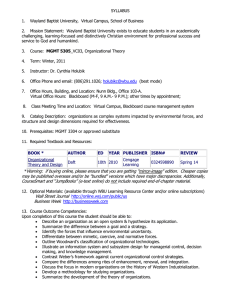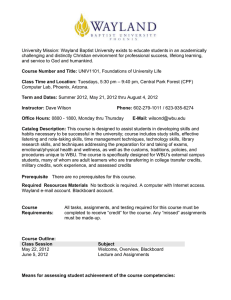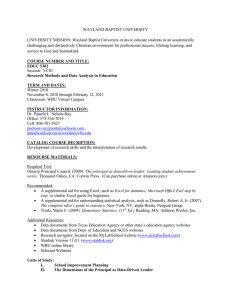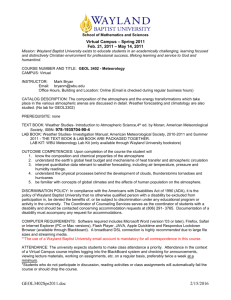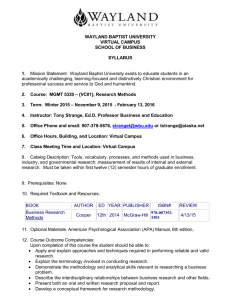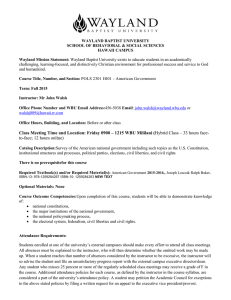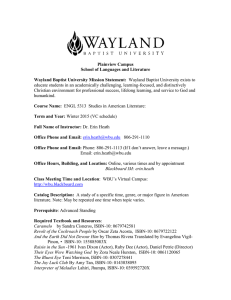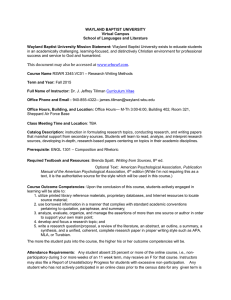ENG 1301
advertisement
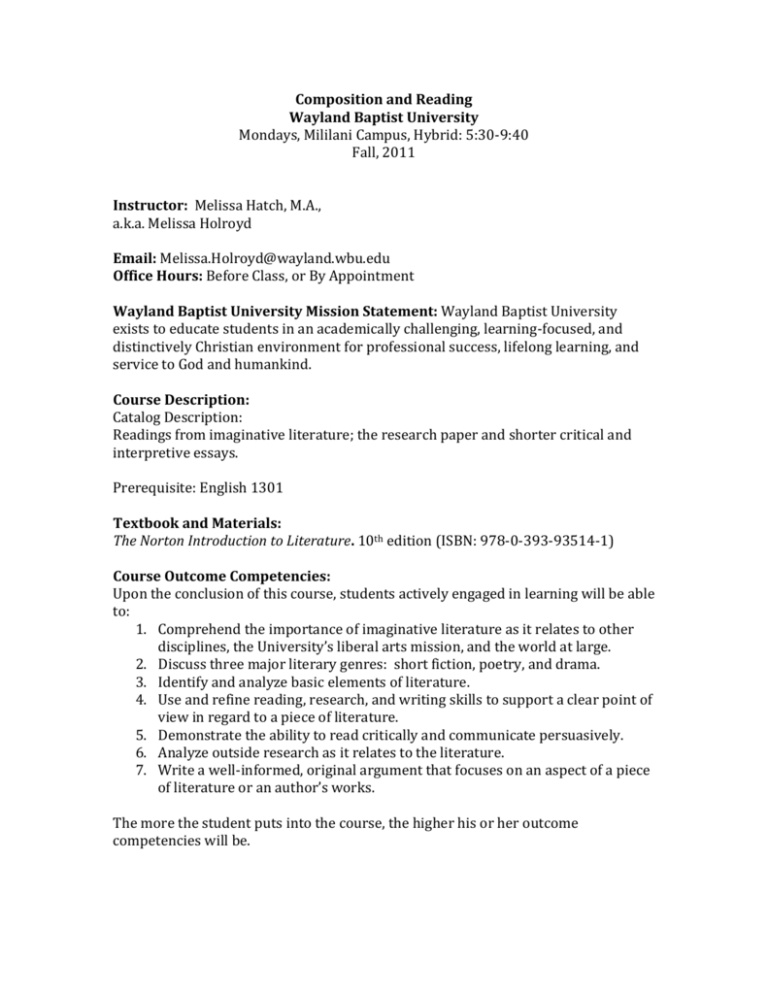
Composition and Reading Wayland Baptist University Mondays, Mililani Campus, Hybrid: 5:30-9:40 Fall, 2011 Instructor: Melissa Hatch, M.A., a.k.a. Melissa Holroyd Email: Melissa.Holroyd@wayland.wbu.edu Office Hours: Before Class, or By Appointment Wayland Baptist University Mission Statement: Wayland Baptist University exists to educate students in an academically challenging, learning-focused, and distinctively Christian environment for professional success, lifelong learning, and service to God and humankind. Course Description: Catalog Description: Readings from imaginative literature; the research paper and shorter critical and interpretive essays. Prerequisite: English 1301 Textbook and Materials: The Norton Introduction to Literature. 10th edition (ISBN: 978-0-393-93514-1) Course Outcome Competencies: Upon the conclusion of this course, students actively engaged in learning will be able to: 1. Comprehend the importance of imaginative literature as it relates to other disciplines, the University’s liberal arts mission, and the world at large. 2. Discuss three major literary genres: short fiction, poetry, and drama. 3. Identify and analyze basic elements of literature. 4. Use and refine reading, research, and writing skills to support a clear point of view in regard to a piece of literature. 5. Demonstrate the ability to read critically and communicate persuasively. 6. Analyze outside research as it relates to the literature. 7. Write a well-informed, original argument that focuses on an aspect of a piece of literature or an author’s works. The more the student puts into the course, the higher his or her outcome competencies will be. Course Requirements: Class participation is a must. You will collaborate with your classmates as we read and respond to great works of literature. It is imperative that you keep up with the reading, especially since this is only a ten-week course. Come to class, or be online, prepared to participate in an engaging and relevant discussion. Class participation is worth 30% of your grade, and I judge this based both on your attendance, your participation in relevant discussions, and my own discretion, so act accordingly. Do not escape in your laptop or make too frequent trips outside the classroom. Library Research for your final paper is important. While I understand that access to a physical academic library may be difficult for you here in Hawaii, such circumstances do not excuse you from rigorous academic research. We have a multitude of virtual library sources available to you, and I expect you to become familiar with these academic resources. Read all introductory sections of your textbook, regardless of whether or not I assign them. I will also be posting guides to reading as well as notes for your reading to Blackboard. Since this is partially an online course, I expect you to check these regularly as you read and write. Assignments You will write a total of 8 response papers on readings that I will assign. Hardcopies are due the next day that we meet in class. Your responses should be 2-3 pages each, typed, double-spaced, in APA format. Check Blackboard for examples of response papers. Your responses to the readings should be thoughtful and insightful. You should cite or reference specific moments or lines from the readings. Responses should be YOUR OWN thoughts, not ideas from Spark Notes or some other source. Be aware that I take plagiarism seriously. You will also be responsible for discussion threads on Blackboard. I will post a discussion thread each week, no later than Monday. Everyone must respond to the discussion, and be sure to check regularly; this is a discussion, so classmates may be asking you questions or expanding on your ideas. Participation is key here. As a final assignment, you will write a formal paper on a work that we’ve read or an author of your choice. The subject matter is entirely up to you, so choose something that really interests you. You should use the literature in the field (e.g. journal articles, books, outside research, etc.) to support some of your ideas, or at least to help make your case. Citing specific examples from the text (or an author’s work) is also crucial for a paper of this nature in the form of quotations and direct references. I will post some sample papers to Blackboard. Choose something to discuss, such as setting, a character, a running theme, etc. You may opt to discuss similar aspects, such as themes or characters of an author’s works. Make a claim that tells us something interesting about your topic. Sample writings from your textbook are helpful. Also pay close attention to section 9 in your book. This is not meant to be a biography of an author, so if you choose to focus on an author, you should focus on the actual works from the author, not the author him/herself. The paper should be 6-8 pages in length, and it is due the last day of class. Drafts will be due the week prior. You may want to look ahead in our reading schedule and see what peaks your interest. Reading ahead to start early on your research paper will enable you to write an effective paper. I suggest starting no later than 4 or 5 weeks into class. Research papers take time to write properly, and you should be spending a significant amount of time collecting and reading research. I encourage you to get an early start. You may choose to write a paper that expands on one of your response papers. Overlap in this case is okay. Attendance: From WBU: “Students enrolled at one of the University’s external campuses should make every effort to attend all class meetings. All absences must be explained to the instructor, who will then determine whether the omitted work may be made up. When a student reaches that number of absences considered by the instructor to be excessive, the instructor will so advise the student and file an unsatisfactory progress report with the campus executive director/dean. Any student who misses 25 percent or more of the regularly scheduled class meetings may receive a grade of F in the course. “ Bottom line: don’t miss class! This is a short semester, which means I have packed daily lessons with more than is typical for a traditional 16-week course. Each unexcused absence will result in a 5% reduction of your class participation grade. Grading Your course grade will be based primarily on your proficiency as measured by your performance on assigned work. In general, a grade of ‘A’ means Excellent, ‘B’ means Good, ‘C’ means Average, ‘D’ means Poor. 93-100% (A = 4.0) 90-92% (A- = 3.7) 87-89% (B+ = 3.3) 83-86% (B = 3.0) 80-82% (B- = 2.7) 77-79% 73-76% 70-72% 67-69% 60-66% 0-59% (C+ = 2.3) (C = 2.0) (C- = 1.7) (D+ =1.3) (D = 1.0) (F = 0) Grade Breakdown Class Participation/Discussion Final Exam 30% (Weekly discussion threads are worth 12.5 points each) 10% Response Papers Final Paper 40% (5% each, worth 50 points each) 20% Special Needs: Notice to Students Experiencing Disabilities: It is university policy that no otherwise qualified disabled person be excluded from participation in, be denied the benefits of, or be subject to discrimination under an educational program or activity in the University. Students should inform the instructor of existing disabilities the first class meeting. (Documentation of disability may be required.) Statement to Students to retain course research papers [for undergraduate course only]: WBU degree-seeking students are strongly encouraged to retain copies of all research papers. To graduate from WBU, students must complete the senior Exit Seminar course, GRAD 4101. The Exit Seminar is designed to capstone an adult learner’s discipline knowledge through the completion of a discipline portfolio or the completion of an approved research project. The research papers retained from previous courses, particularly courses within the discipline, will aid the adult learner in completing the GRAD 4101 course. About Academic Integrity & Rigor Copying material that is not your own without indicating the source of the material is called plagiarism. Plagiarism is cheating. The most blatant form of plagiarism is to copy someone else’s words—sentences—verbatim, but to use someone else’s idea in your writing, giving the impression that it is your own idea, when it has been borrowed, is also plagiarism. In general, plagiarism and other forms of dishonesty will result in a failing grade for the course and the submission of documentation for the student’s university records. At the instructor’s discretion, the penalty may be less severe, e.g., forfeiting all points possible for that assignment and an equivalent number of points being deducted from the course total. If you have any questions about what academic integrity means in this course, please ask me. I’d be happy to answer your specific questions. Course Calendar Week 1, April 9—Meeting (Please Read these works before class on the 9th). The Canon Assignments for this week: Intro, Pgs. 7-9 Fiction 12-13 Brewer 20/20, 16-17, Sample Writing 17-19 Carver, 28-38, Sample Writing 40-43 Wharton, 85-95 Kincaid 116-122 Morrison 139 Response Paper: Toni Morrison’s Recitatif Week 2, April 16—Not Meeting Chekhov, 169-80, Sample Writing 203-207 Hawthorne, 213-223 Poe, 101-105 Kincaid 116-122 Response Paper: Nathaniel Hawthorne’s The Birth Mark OR Alice Munro’s Boys and Girls Week 3, April 23—Meeting Crane, 255-71 Faulkner 389-91, Read A Rose for Emily (391) Johnson, 401 Watkins, 403 Stafford, 404 Fetterley, 406 Klein, 411 Bierce, 457 Updike, 589 Rushdie, 579 Munro, 570 Response Paper: John Updike’s A&P Week 4, April 30—Meeting Fiction Women in Literature Assignments for this week: O’Connor, 294-99 O’Connor A Good Man is Hard to Find (299) and Everything that Rises Must Converge (323) Chopin, 353-54 Gilman 354 Glaspell 365 Boyd, 382 Lyttelton, 383 Erdrich, 276-90 Response Paper: Flannery O’Connor’s Everything that Rises Must Converge Week 5, May 7—Meeting Atwood, 438 Mason, 524 Welty, 593 Response Paper: Bobbie Ann Mason’s Shiloh Week 6, May 14—Not Meeting Poetry Assignments for this week: We will discuss Shiloh in class this week. We will also discuss women in literature before moving onto poetry. Heavy discussion on research paper that is due Dec. 5th. Don’t miss this class! Research instruction for final paper. Important: Please read sample research papers from Blackboard before coming to class. Reading Poetry 618 Browning, 619 Responding to Poetry 623, 630 Jonson, 624 Writing about Poetry 636 Sample Writing 640 Theme and Tone 651 Piercy, 652 Snodgrass, 653 Blake, 658 Atwood, 675 Browning, 676 Lady Chudleigh, 689 Cofer, 695 Rosenberg, 696 Pastan, 702 Wilde, 748 Burns, 754 Donne, 757 Olds, 768 Frost, 768 Rich, 769 Frost, 1019 Keats, 1031 Pound, 1041 Whitman, 1046 (I Hear America Singing) You are free to choose a poem that strikes you (except for The Road Not Taken). Make sure you choose something that you can write on with an ample amount of interest. Week 7, May 21—Not Meeting Harlem Renaissance, 947 Bontemps, 956 Cullen, 957 Grimke, 958 Hughes, 959 (Harlem and The Weary Blues) Johnson, 962 McKay, 963 (If We Must Die and The Tropics in New York) Du Bois, 974 Hurston, 975 Locke, 966 Fisher, 970 Response Paper: Choose one author from the Harlem Renaissance, and respond to the actual work. Week 8, May 28—Meeting Drama Today we will also discuss the Harlem Renaissance. Assignments for this week: Reading Drama, 1070 You may also want to look at Responding to and writing about Drama. Elements of Drama, 1125-34 Performance as Context, 1399-1404 Williams’ A Streetcar Named Desire, 1408 Read the whole play . Be sure to mark your text so that you have something to come back to. Response Paper: Williams’ A Streetcar Named Desire. Week 9, June 4—Not Meeting Take Home Final Essay Exam I will post the prompt to Blackboard. Drafts of Research Paper Due Email me your draft, and we will arrange peer review, which you need to do no later than June 7th. Email your peer’s paper to him/her by 10:00 PM June 7th. Assignments for next week: Research Paper due next week! Week 10, June 11—Meeting Streetcar Discussion Final: Objective portion of final exam today: Quotation Identification and Character Identification.
